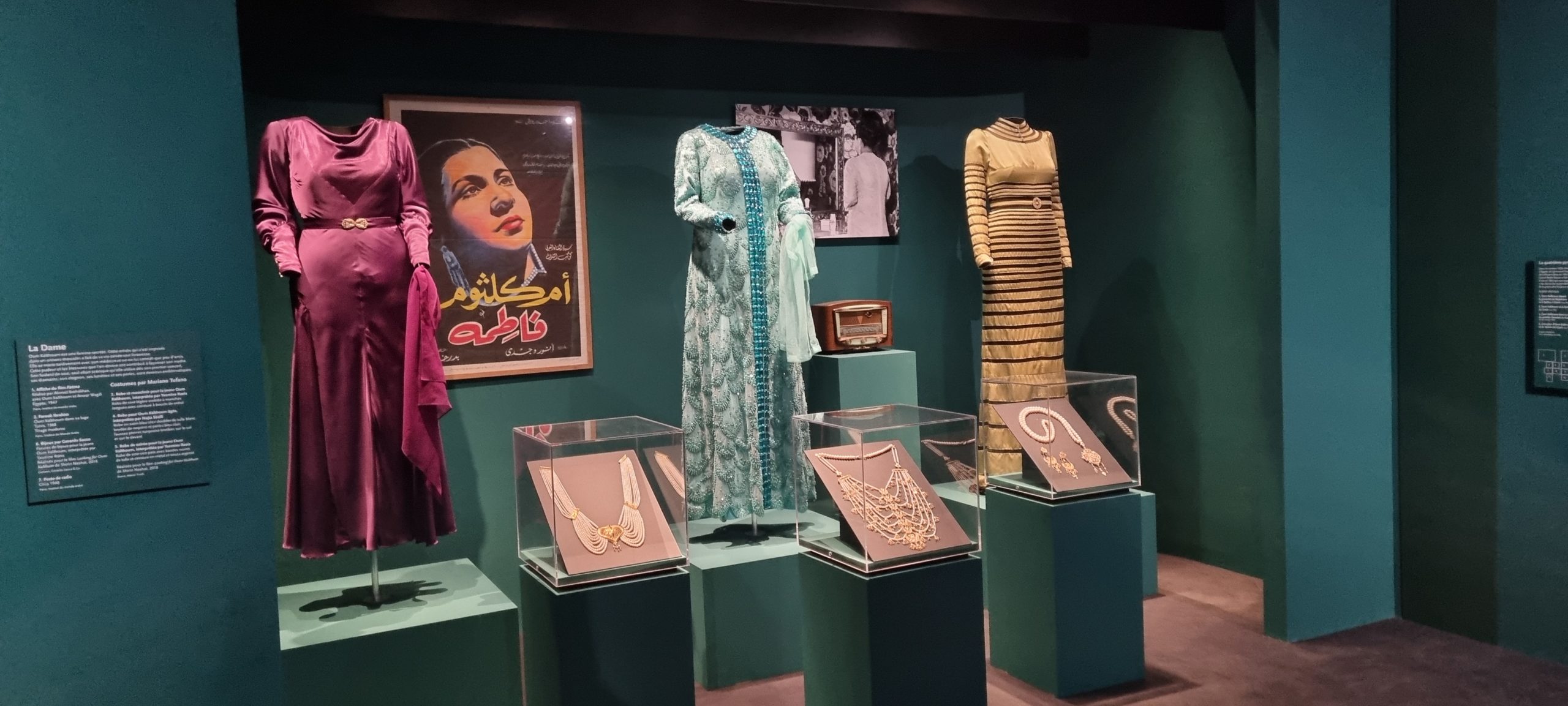This weekend JustFocus went to the Arab World Institute to discover the exhibition dedicated to oriental divas. The exhibition is on view until September 26, 2021 and traces the life and work of these powerful icons in the context of post-war Arab societies. Singers, directors, dancers, actresses or screenwriters, Oum Kalthoum, Laila Mourad, Warda but also Dalida, the Arab World Institute pays tribute to all these women who constituted the golden age of Arab cinema and music. We urge you to discover these women who were the voices and faces of the Arab world.
AN INVITATION TO DISCOVER THE LIFE AND CAREER OF THE GREAT DIVAS FROM THE 1920S TO THE 1970S.
Let's start our walk in the amazing world of oriental divas. From the entrance of the exhibition we are greeted by the faces of these divas and are lulled by their voices.
Enhanced by a well-orchestrated scenography, each piece corresponds to the portrait of a legend of music and cinema and traces his life, his work. It should be noted that the Middle East was one of the biggest crossroads of cinema. The décor of these rooms recreates the atmosphere of the time and their history. We discover a whole range of objects, stage outfits, photos lent by the relatives of the divas. A great way to gather pieces that concern them. Oum Kalthoum, Asmahan, Fayrouz, Warda, Tahyyia Carioca, Samia Gamal, Laila Mourad, Sabah, Souad Hosni, Faten Hamama and Hind Rostom are gathered and honored. As you walk around you can discover the personal belongings of um Kalhtoum. Adulated from Rabat to Damascus, she is undoubtedly the most remarkable artist of the Arab world of the 20th century. This icon of Egyptian popular culture does not eclipse the other figures who marked this period. 
DIVAS AND PIONEERS OF FEMINISM
These icons, both unreal, sometimes with broken destinies, are also revolutionary and courageous women who have carried feminism. Indeed, these women, in addition to being genius interpreters with great charisma, have taken a stand and assumed the role of feminists. Symbols of freedom and the emancipation of women in a society dominated by men, they met in their living rooms to campaign and plead, among other things, for the education of young girls. These divas also played a political and cultural role in an era marked by the Israeli-Palestinian conflict, the 6-day war, the war in Lebanon, and the rise of Islamism.
A TRANS AUDIENCE
These divas had a knack for exalting and galvanizing audiences. Alone on stage, they fascinated a large cosmopolitan audience. You will discover archive images of a mythical concert of Fayrouz. The icon of Lebanese and Arabic song performs "Habbaytak bel sayif" which means "I loved you in winter". The artist carries us away and we willingly abandon ourselves to his voice of incredible strength and delicacy. The Olympia was an important Parisian stage for Arab divas and also hosted Oum Kalthoum and Warda El Djazaïria in the 70s. 
STUNNING OUTFITS
The exhibition also features some stage dresses worn by divas. You can discover the dresses of Sabah or Dalida, Miss Egypt 1954, who began her career in Egyptian cinema before flying to the France. 
THEIR CURRENT LEGACY
Even today the new generation is inspired and samples songs, proof that these divas remain and will remain a source of inspiration for many artists. The project by Randa Mirza and Wael Kodeih entitled Love & Revenge – Glory and Tears (Tarmentini – Fakir – Galbi) is proof of this. This exhibition is a new look at women artists in the Arab world. It is accessible to a wide audience who will then be able to discover and understand how these powerful women came to the forefront of the international scene and marked the artistic and cultural world forever. Curious or music lovers, book your place and run to the IMA! If you want to continue the experience, a playlist is available on the France Inter website. The IMA is also hosting the Arabofolies festival from 5 to 30 June 2021.
To get there: 1, rue des Fossés-Saint-Bernard, Place Mohammed-V 75005 Paris Metro : Jussieu (7) Reservation : 01.40.51.38.14 Website : www.imarabe.org





















![Sum’One sort la pépite électro Let It Snow et le EP Hello Vera Sum'One - Let It Snow [Official Video]](https://www.justfocus.fr/wp-content/uploads/2024/11/SumOne.jpg)














